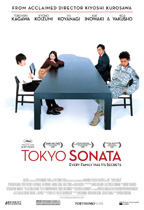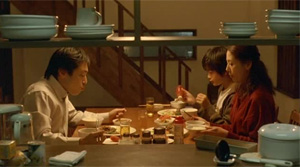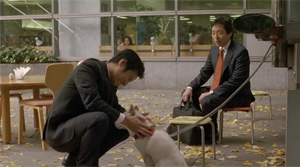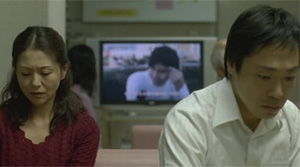

Tôkyô sonata
Japan 2008
Genre:
Drama
Director:
Kiyoshi Kurosawa
Cast:
Teruyuki Kagawa
Kyôko Koizumi
Yû Koyanagi
Kai Inowaki
Haruka Igawa
Kanji Tsuda
Kôji Yakusho
Kazuya Kojima

Tokyo Sonata
Story: Ryuhei Sasaki (Teruyuki Kagawa) is a white-collar worker until he is fired without warning. Since he doesn't know how to face his
family now that he has lost his job he leaves the house every morning as usual. He secretly is looking for a new job, but all the job offers are way beneath
him. By chance Ryuhei runs into an old friend of his, who suffered the same fate. As does his friend's wife Megumi Sasaki (Kyôko Koizumi) also seems to suspect
that something isn't right. Meanwhile, the older son Takashi (Yû Koyanagi) does some casual work without having any real perspective while the younger
son Kenji (Kai Inowaki) wants to learn the piano at all costs, but doesn't get the permission of his father. Therefore, Kenji learns in secret how to
play the piano and Ryuhei eventually finds himself forced to take on some lowly work. But at home he needs to continue keeping up appearances, because
should he lose the respect of his family he would have nothing left in life to cling to. Megumi tries to hold the family together the best she can but a crisis
seems to be unavoidable.
Review: "Tokyo Sonata" is an unusual drama that wanders the thin line between being depressive and hopeful. Unfortunately, the movie sometimes
also gives the impression that the filmmakers didn't know where they wanted to go with it, but strangely in the end the many shifts in direction add up to an
epic image of a family that needs to undergo several trials. There may be an aftertaste of the imperfect remaining but after all that's also
what the drama centers around. Life doesn't always take the nicest twist and to stick together as a family despite of that is especially difficult.
Exceedingly likeable is that the problems are examined with a differentiated eye. There is no simple solution and yet the movie by far doesn't feel frustrating,
which makes it stand out from similar works.

We also learn a lot about Japanese culture. Particularly that it is impossible for a family man to explain to his wife that he has lost his job. Not only
Ryuhei is affected there are also other men spending their time on the street in their business suite and with a briefcase, lining up at the local food bank.
Nothing is more important than saving face in front of the family and friends. This is brought to extreme by a friend of Ryuhei who sets his cell phone to
ring five times an hour so that he seems busy. And this even though it seems to be everything but likeable that his wife isn't already in the know about
his unemployment. But Ryuhei is even admiring him for this performance and tries to learn a lesson from him. There is even a sub-culture of secret
unemployed in Japan.

Where other dramas would pause the rest of the time to shed some light on the suffering of a family with quiet pictures, director Kiyoshi Kurosawa
("Pulse", "Cure") puts additional subjects on the table. The narrational perspective changes frequently in
order to take a closer look at the suffering of the housewife as well. She plays solely the role of a mother and wife, as do so many Japanese women, without
having a real character herself. But in the course of the film we get to know more about her dreams, like the driver's license which she finally gets, and that
she feels as if being caught in a dead end. Kyôko Koizumi delivers the most surprising performance as she later on
brings to bear different facets in a subtle way of which at first we didn't even know she had them.
The two sons also get some screen time. The older one wants to protect his family and thus joins the US military, mainly because of a lack of alternatives, though.
The younger son realizes that his fate is to learn playing the piano, but he doesn't get the permission of his father to learn the instrument. Accordingly,
"Tokyo Sonata" also revolves around dreams and especially those that you need to give up. What's very striking are most of all some coincidences that have
found their way into the film. They aren't just dramatic but in a certain way also seem deliberately unintentionally funny because of their constructedness
which suggests parallels to the Korean director Kim Ki-Duk. This more than anything else applies to the mugging and the series of events unfolding afterwards,
which unexpectedly also add some suspense to the movie.

Kiyoshi Kurosawa likes to implement the supernatural into his movies and he manages to create the kind of fear that results from the primary instincts: The fear of being lonely. That's also the special effort of "Tokyo Sonata". The mood oftentimes shifts to frightening melancholy that evokes an unusual kind of fear. Nonetheless, this feeling never becomes unbearable as the movie's tone constantly alternates and there is also hope flowing into the dark gravity of everyday drama. Since "Tokyo Sonata" aims at working on a subtle level there is also something artificial about it. Towards the end the drama becomes almost exhausting, yet it is everything but a tearjerker. This is very positive to note. Furthermore, the art house typical ending can be very rewarding.

Disclaimer

















